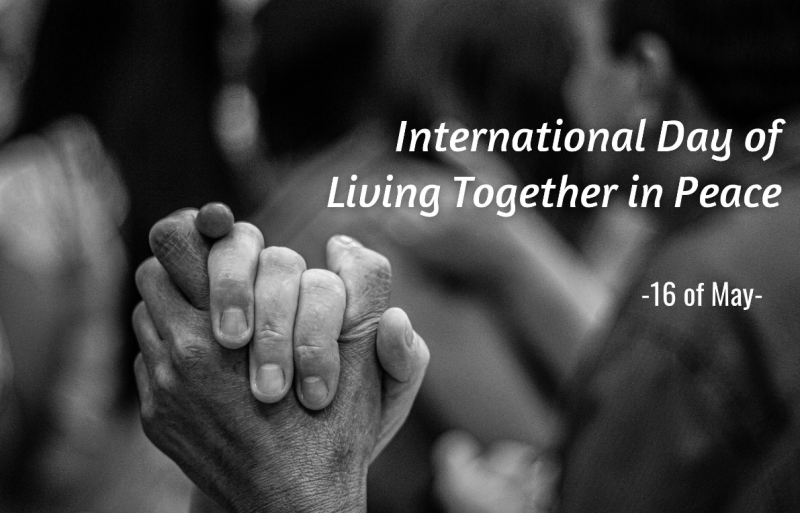
Every year on May 16th, the world observes the International Day of Living Together in Peace, a day dedicated to promoting harmony, tolerance, and solidarity across all nations and communities. Established by the United Nations General-Assembly (resolution 72/130), this day addresses global security concerns, social disparities, and advocates for understanding, empathy, and collaboration. Later this year, in November, a significant conference will be held in New Delhi, bringing together brilliant minds to discuss innovative approaches to fostering global peace and understanding.
In this context, it is necessary to show how cooperatives play a crucial role in celebrating and advancing the principles of the International Day of Living Together in Peace. As mentioned in the Declaration of Positive Peace through Cooperatives of 2019, cooperatives play a significant role in promoting positive peace by addressing human needs and aspirations, creating sustainable and inclusive economies, and fostering a culture of democracy, equality, solidarity, and community concern. They offer a practical model for how communities can work together harmoniously to achieve common goals, making them highly relevant to the objectives of this international observance.
Cooperatives are then instrumental in promoting economic inclusivity and social equity. By providing members with access to resources, education, and opportunities, cooperatives help reduce economic disparities and empower marginalised groups. This enables a sense of belonging and mutual respect among diverse community members which is essential for peaceful coexistence. They enable individuals, especially those in underserved communities, to pool resources and gain collective bargaining power, thus, improving their economic standing and reducing poverty which is often a root cause of conflict.
For instance, on March 11, 2011, Japan experienced the largest earthquake ever recorded, leading to a tsunami and the Fukushima Daiichi nuclear disaster. This disaster is considered the second-worst in history - ranking second to the Chernobyl incident - forcing over 100,000 people to relocate due to radiation contamination affecting crops and livestock. Following the Fukushima nuclear accident, Japanese cooperatives played an important role in resolving the issues faced by radioactive pollution. University cooperatives urged nuclear proliferation protests, community-based cooperatives supported affected communities, and fishermen's cooperatives collaborated with scientists to monitor seafood safety.
The Japan Agriculture Cooperative Group (JA Group) played a vital role to promote peace after the incident. The JA Group consists of the national network of 694 regional co-ops in Japan, these cooperatives play a pivotal role in the country’s agricultural industry. After the Fukushima disaster, there was great collaboration with university cooperatives, community-based cooperatives and fishermen’s cooperatives to ensure: stability and well-being of farmers, food security, community resilience, disaster recovery and cooperative principles. The Japan agriculture cooperative group and Fukushima University collaborated on a Soil Screening Project to combat safety inspection challenges and restore consumer confidence in local produce by testing contamination levels.
University cooperatives also played an essential role in non-proliferation efforts by promoting nuclear safety, security, and policy change. Their efforts were centred on education, research, and international collaboration to address the hazards connected with nuclear energy and prevent the proliferation of nuclear weapons. University cooperatives supported the Non-Proliferation Treaty by advocating disarmament, limiting the spread of nuclear weapons, and allowing peaceful nuclear energy usage, as well as offering research and policy suggestions that would enhance implementation.
These initiatives not only improve the quality of life but also strengthen communal bonds by bringing together individuals from various backgrounds to work towards common goals, cooperatives help break down social barriers and promote inclusivity. It can be seen how agricultural cooperatives, for example, help farmers in conflict-prone areas collaborate, share resources, and access markets, reducing competition and fostering peaceful relations.
As we commemorate the International Day of Living Together in Peace, it is essential to reflect on the progress made and the challenges that lie ahead. In a world where conflicts and divisions often dominate headlines, this day serves as a poignant reminder of our collective responsibility to build a more harmonious global community. Cooperatives exemplify how collective action and mutual support can lead to sustainable peace and development. By promoting economic inclusivity, democratic participation, and community solidarity, cooperatives not only help address the root causes of conflict but also build resilient communities capable of living together in harmony. As Ariel Guarco (President of ICA) once said “to cooperate is just another verb for peace-building”. Thus, embracing and supporting the cooperative model is a powerful way to advance the goals of this significant day and work towards a more peaceful world.




